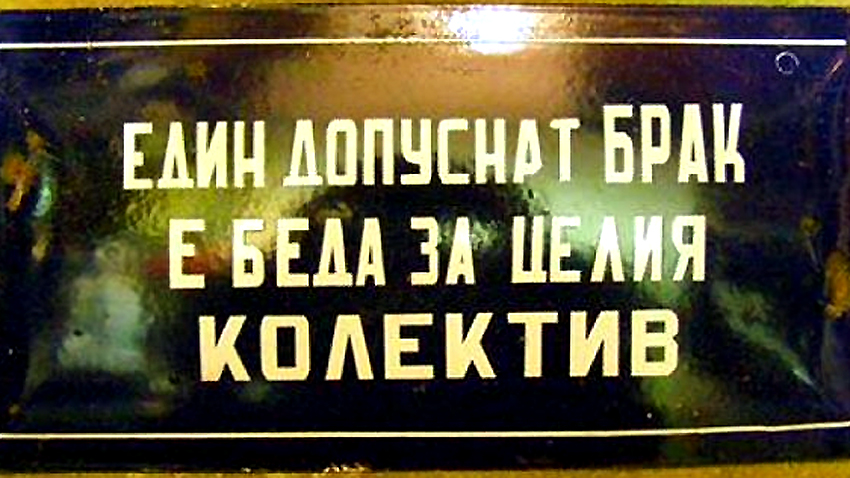
The older generations in Bulgaria remember the enamel plate signs that adorned streets and factories in communist times. Nowadays they sound no less ridiculous than they did then: Allowing spoilage once - a blot on the collective (work team), or: All deserving communists - underground! Pernik Mines, etc.
 Such emblematic signs have inspired many a collector. But combining a passion for collecting them with the profession of historian may give astonishing results - an exhibition in a barn! Because that is where Plamen Subev, Director of the Museum of History in Popovo, has hung up his plate signs:
Such emblematic signs have inspired many a collector. But combining a passion for collecting them with the profession of historian may give astonishing results - an exhibition in a barn! Because that is where Plamen Subev, Director of the Museum of History in Popovo, has hung up his plate signs:
“I am interested in everything that is on its way out and is discarded,” he says. “Including…”
“…the spirit of those times, that gave birth to so many prohibitions and then sought to hammer them into people's heads by any means. I have a different philosophy - one doesn't need warnings to stick to the straight and narrow, everywhere you turn you see “turn left”, “turn right”. But times being what they were back then, we still need to preserve them, even if it is by preserving the plate signs.”
If we are to regard the plate signs as a testimony to what those times were like, how would people interpret them, say a thousand years from now?
“In any event, they will be a flashback to a time squeezed into a uniform,” Plamen Subev says. “But there is no way of knowing whether one thousand years from now the uniform mightn't be even tighter - a time there shall be no need to think, when we shall be programmed where to go, what to do depending on what the signs say. Without being a fantasy writer, I shall hazard a guess - there will come a time of order, of norms, of boundaries. We don't have signs now but here we are - collecting the old signs and feeling all nostalgic about that period - though that too is commendable.”
The plate sign Plamen Subev would dearly love to add to his collection goes: The people's militia (as the police were then called) is the beating heart of the party, because of the deeper layers of meaning and the equivocacy born of a not overly astute party intellect.
Unlike the times “before”, the “new times” following the collapse of totalitarianism never gave birth to any original signs, just copied the technology of the old ones, the historian says. And though they may be enamel and imitate the original ones, these signs are not authentic.
“Under capitalism, man exploits man, under socialism it is the other way round,” goes one of the imitations current online.
Still, authentic signs can still be found at scrapyards or around dilapidated buildings. “And when they are a gift from a friend, that opens the floodgates of memories,” says Plamen Subev and adds that the history of the find is sometimes more valuable than the find itself. And promises that some day he will donate his collection to the museum, as he has already done with his collection of autographed antiquarian books.
English version: Milena Daynova
"You say you are Bulgarian, but you do not know Bulgarian" – this reproach from officials in Bulgaria has been faced by quite a few by our compatriots from the historical Bulgarian communities around the world. One of them is Bledar Alterziu from..
The survival of millions of people around the world, living in conditions of war, hunger, disease and immense despair, is at stake every day. We often approach immigrants from such countries with hostility rather than understanding. What they have..
Modernizing critical thinking skills, fact-checking skills and media literacy are essential for society, especially for young people in Bulgaria - the country with one of the lowest media literacy indices in the EU, reports the educational platform..

+359 2 9336 661
